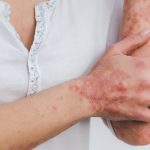We hear a lot of bad news about how ultra-processed foods affect our health.
Indeed, a study published in the British Medical Journal last year linked ultra-processed foods with 32 different types of health problems.
These health issues included a little bit of everything. Cardiovascular disease, type 2 diabetes, cancer and early death were some of the big ones. But there were also links to mental health disorders, depression, anxiety, poor sleep and wheezing.
Now, new research adds psoriasis to the list.
While psoriasis isn’t necessarily life-threatening, it can make life extremely uncomfortable. A lot of it is because of the itching, cracking and pain associated with it. But there is also the issue of those ugly skin plaques and flaky skin. These can easily result in low self-esteem, anxiety about appearing at social events, and even depression.
The Link Between Ultra-Processed Foods and Inflammation
Psoriasis is an inflammatory skin condition that involves the body’s immune response. Just last year I wrote about how the foods you eat and the health of your gut microbiome play a big part when it comes to psoriasis and other inflammatory skin conditions.
Today I want to add a further warning…
If you are eating ultra-processed foods, you are going to be more likely to experience active psoriasis flare-ups.
The authors of a study published in November of 2024 identified three groups of people. One group consisted of people who have never had psoriasis. Another group included individuals with active psoriasis. The third group was made up of people who had psoriasis that was not currently active.
Then, their dietary intake of ultra-processed foods was compared with their psoriasis status. The results?
As it turned out, the people with active psoriasis ate the largest amounts of these unhealthy foods. The link to psoriasis was clear, even after considering other factors!
This makes so much sense, because eating ultra-processed foods negatively impacts the gut microbiota and leads to inflammation.
It may also explain why so many of the health issues mentioned earlier (cardiovascular disease, type 2 diabetes, etc.) are extremely common co-morbidities in psoriasis patients.
Simply put, it’s probably not the fact of having psoriasis itself that causes the co-morbidities. More likely, it’s the unhealthy foods and gut microbiome disruptions that is the common denominator among them.
The Sneaky Side of Ultra-Processed Foods
One of the things I find deeply disturbing is that while we all think we know what an ultra-processed food is, we really don’t.
Sure. You know that if you enjoy a pastry in the morning, make a sandwich with processed meat, white bread and chips for lunch, and order a pizza for dinner that you’re going to get a super-dose of fake food. So you generally don’t do it.
You probably even recognize that a lot of meals served in restaurants are not going to be entirely good for you. In that case, you might reserve eating out for special occasions.
But when you’re at home, you try to make healthy choices. Maybe like choosing to eat meat “made from plants.”
I’ve said it before, and I’ll say it again. Plant-based meat alternatives are nothing more than ultra-processed junk food. They aren’t brimming with whole plant foods or veggies. There are no beans, greens, nuts, seeds or carrots in them.
You are much more likely to find words like soy or pea protein isolate, methylcellulose, calcium alginate, xanthan gum and other undecipherable stuff on the ingredient list.
This pretty much meets the definition of an “ultra-processed” food – defined as foods made from substances extracted from real foods, synthesized to add flavor… and engineered to make fake foods taste and feel like they’ve never been processed at all.
Other things to watch out for are processed and flavored yogurts, breakfast cereals, packaged cold meats, granola/protein/snack bars, canned soups (no matter how health they sound), and margarines – which we were once told were good for us!
Make sure to check out this article for more food tips to resolve psoriasis flare-ups and other skin issues.
SOURCES:
Lane MM, Gamage E, Du S, Ashtree DN, McGuinness AJ, Gauci S, Baker P, Lawrence M, Rebholz CM, Srour B, Touvier M, Jacka FN, O’Neil A, Segasby T, Marx W. Ultra-processed food exposure and adverse health outcomes: umbrella review of epidemiological meta-analyses. BMJ. 2024 Feb 28;384:e077310.
Jankowiak B, Kowalewska B, Krajewska-Kułak E, Khvorik DF, Niczyporuk W. Relationship between self-esteem and stigmatization in psoriasis patients. Postepy Dermatol Alergol. 2020 Aug;37(4):597-602.
Penso L, Touvier M, Srour B, Ezzedine K, Sbidian E. Ultraprocessed Food Intake and Psoriasis. JAMA Dermatol. 2024 Nov 27.
Shi Z. Gut Microbiota: An Important Link between Western Diet and Chronic Diseases. Nutrients. 2019 Sep 24;11(10):2287.



